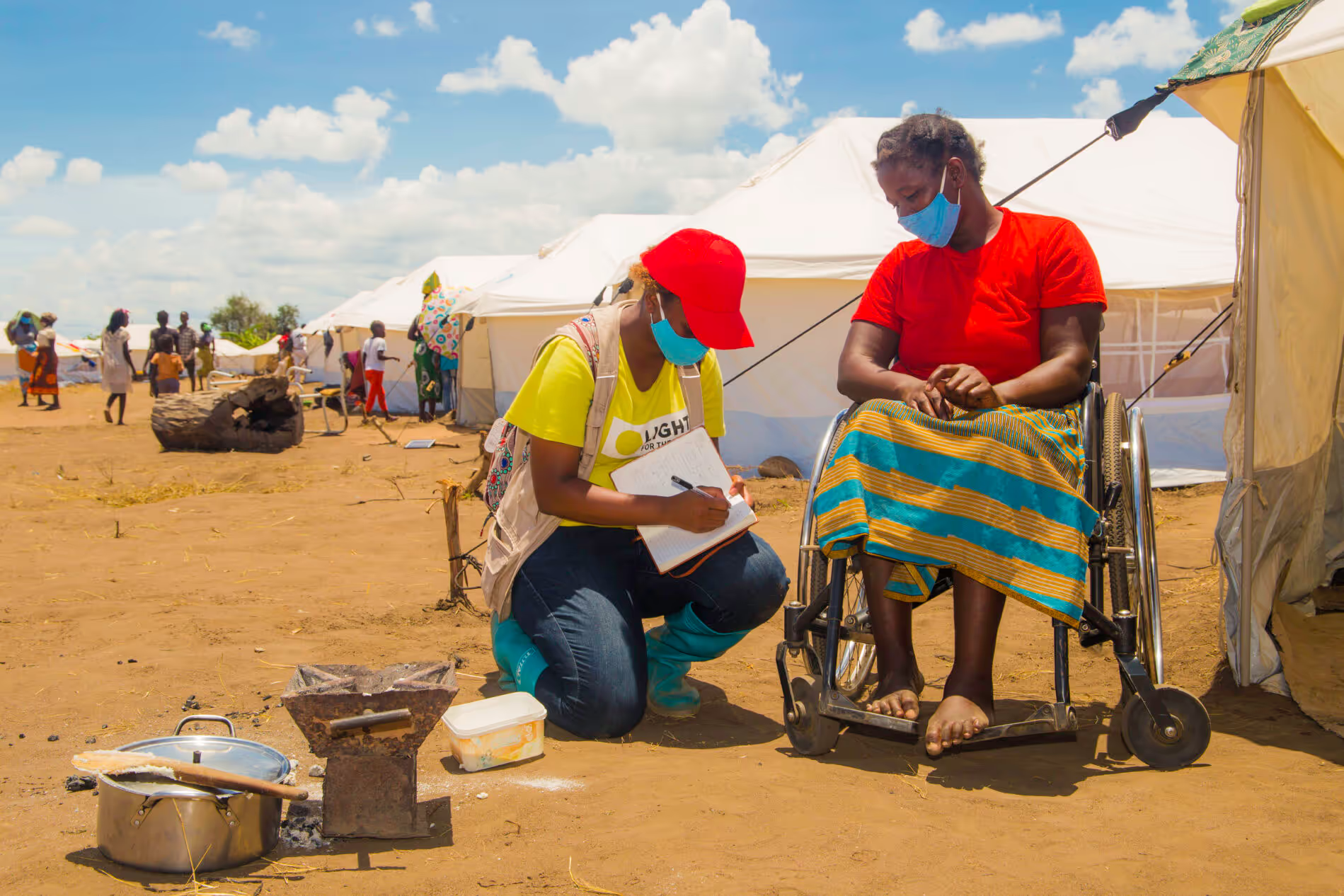Data That Matters

Project overview
This innovation is a mixed methods rapid assessment tool for identifying persons with disabilities and the existing barriers and enablers they, and older persons, face in accessing humanitarian assistance.
Project solution
This project offers [specific solution or intervention] to tackle [challenge]. By implementing [strategies, tools, or innovations], the project aims to achieve [desired outcomes]. The approach is designed to [specific actions or methods] to bring about meaningful change in [community, region, or issue area].
Expected outcomes
This project aims to achieve [specific outcomes], such as [measurable results, improvements, or changes]. The expected impact includes [benefits to the target community, advancements in research or innovation, or long-term effects]. By the end of the project, we anticipate [specific changes or milestones] that will contribute to [broader goals or objectives].
What humanitarian need was addressed?
Accurate data on the number of persons with disabilities and their specific needs is largely missing in most humanitarian contexts.
For example, in Cabo Delgado, Mozambique—home to nearly one million internally displaced people—there is no available information on how many persons with disabilities have been reached by humanitarian assistance, or which of their needs have been addressed.
Without hearing their voices, how can we ensure support reaches those in greatest need? Closing this knowledge gap through better data collection is essential for improved planning, targeting, and ultimately, more inclusive humanitarian action.
How did the innovative solution impact humanitarian practice?
SIRA – the Survey for Inclusive Rapid Assessment – can transform humanitarian data practices by making them more inclusive, participatory, and actionable. Co-created and implemented by persons with disabilities through FAMOD in Mozambique, SIRA reached over 2,500 individuals in Cabo Delgado in 2024. It combines quantitative and qualitative methods, allowing for nuanced insights into barriers and enablers faced by persons with disabilities and older people during crises -thus supporting advocacy efforts and better humanitarian programming.
Unlike traditional tools, SIRA ensures persons with disabilities are not just subjects but data actors —designing, collecting, and using the data generated. Its real-time referrals and screen-reader-compatible digital format enhance both response and accessibility. Grounded in the Washington Group questions and integrating mental health and aging dimensions, SIRA fills a critical data gap; while its open data, open-source, AI-enabled approach, supports low-cost, scalable deployment and evidence sharing.
What progress was achieved and what were the key learnings?
Key learnings highlight the importance of adapting data tools like the Washington Group Questions to humanitarian contexts by integrating mental health and older-age considerations. Inclusive data collection must go beyond methodology to include ownership, usage, and advocacy. SIRA, the rapid assessment tool, effectively captured both quantitative and qualitative data, including barriers related to mental health, GBV, and livelihoods. OPD-led implementation, particularly by FAMOD in Mozambique, proved vital for inclusive and sustainable outcomes. Collective sense-making, after-action reviews, and a clear theory of change supported capacity-building, improved data practices, and strengthened the role of the OPD as equal humanitarian data actor.
Findings from field testing were shared nationally, influencing Mozambique’s humanitarian response plan through FAMOD’s advocacy. In 2025, SIRA is guiding a €2 million Austrian development agency-funded project targeting persons with disabilities and older people in Northern Mozambique. Importantly, over half of nearly 2,500 survey respondents received direct health referrals during data collection.
Future potential and lessons for innovation
SIRA, a modular and adaptable rapid assessment tool, can be used routinely or at specific stages of humanitarian programming. Light for the World plans to integrate SIRA across its work and promote its adoption —fully or in part— by other actors. Freely available on UN OCHA’s Humanitarian Data Exchange, SIRA data can inform both humanitarian and academic efforts -enhancing impact. Ultimately, SIRA's flexibility allows for use in various contexts, including programme-specific targeted sectors like WASH or protection.
Key lessons from the Data that Matters project include the value of disaggregated mental health data —often overlooked in rapid assessments— and the central role of persons with disabilities throughout the data cycle. Their leadership ensures inclusive, relevant data and strengthens advocacy.
Future collaboration with like-minded actors will contribute to impact, particularly by supporting OPDs as data generators and users. Next steps include fostering OPD-to-OPD collaboration on inclusive data during emergencies, and integrating SIRA with Light for the World's Disability Inclusion Advisory model to strengthen referrals at data collection.
Dissemination
The dissemination grant aims to influence policy and practice, share innovative data products globally, and strengthen partnerships. Key activities include publishing both academic and mainstream articles to reach diverse audiences, as well as developing practical manuals for practitioners on inclusive data collection in emergencies. SIRA findings and case studies will be showcased at conferences and meetings, with the sharing of SIRA data and tools forming a core part of our outreach. The grant also supports OPD-to-OPD training on inclusive data, fostering cross-country dialogue and collaboration to advance more inclusive humanitarian action.
Project delivery & updates
Stay up to date with the latest developments from this project. Here, you will find details on what has been delivered, resources created, and regular updates as the project progresses. Access key documents, reports, and other materials to see how the project is making an impact.